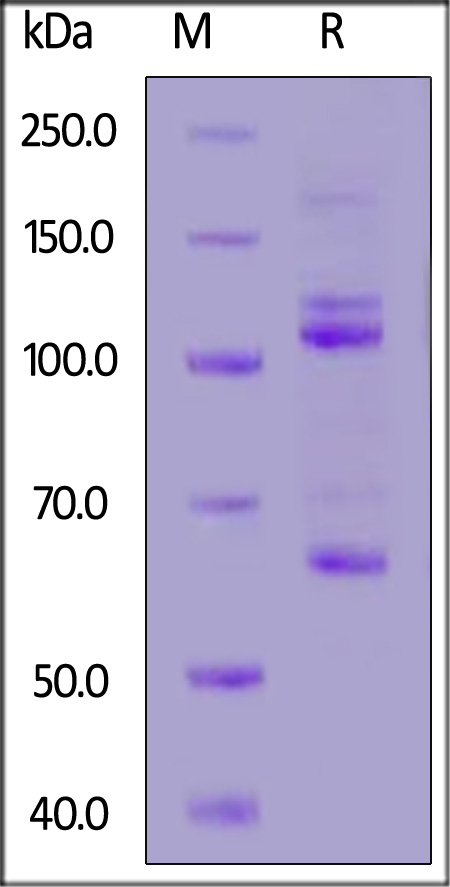分子别名(Synonym)
Complement C3,CPAMD1
表达区间及表达系统(Source)
Mouse Complement C3, His Tag (CO3-M52H4) is expressed from human 293 cells (HEK293). It contains AA Ile 25 - Asn 1663 (Accession # P01027-1).
Predicted N-terminus: Ile 25
Request for sequence
蛋白结构(Molecular Characterization)

This protein carries a polyhistidine tag at the C-terminus.
The protein has a calculated MW of 186.1 kDa. The protein migrates as 70 kDa, 100-120 kDa and 160-180 kDa under reducing (R) condition (SDS-PAGE) due to glycosylation.
内毒素(Endotoxin)
Less than 1.0 EU per μg by the LAL method.
纯度(Purity)
>90% as determined by SDS-PAGE.
>90% as determined by SEC-MALS.
制剂(Formulation)
Lyophilized from 0.22 μm filtered solution in PBS, pH7.4. Normally trehalose is added as protectant before lyophilization.
Contact us for customized product form or formulation.
重构方法(Reconstitution)
Please see Certificate of Analysis for specific instructions.
For best performance, we strongly recommend you to follow the reconstitution protocol provided in the CoA.
存储(Storage)
For long term storage, the product should be stored at lyophilized state at -20°C or lower.
Please avoid repeated freeze-thaw cycles.
This product is stable after storage at:
- -20°C to -70°C for 12 months in lyophilized state;
- -70°C for 3 months under sterile conditions after reconstitution.
电泳(SDS-PAGE)

Mouse Complement C3, His Tag on SDS-PAGE under reducing (R) condition. The gel was stained with Coomassie Blue. The purity of the protein is greater than 90%.
SEC-MALS

The purity of Mouse Complement component 3, His Tag (Cat. No. CO3-M52H4) is more than 90% and the molecular weight of this protein is around 167-204 kDa verified by SEC-MALS.
Report
背景(Background)
C3 is the major complement component serum. It is mainly synthesized by macrophages and liver. C3 plays a central role in the activation of the complement system. Its processing by C3 convertase is the central reaction in both classical and alternative complement pathways. It is cleaved into two fragments, C3a and C3b. C3a anaphylatoxin is a mediator of local inflammatory process. In chronic inflammation, acts as a chemoattractant for neutrophils. After activation C3b can bind covalently, via its reactive thioester, to cell surface carbohydrates or immune aggregates. It induces the contraction of smooth muscle, increases vascular permeability and causes histamine release from mast cells and basophilic leukocytes.























































 膜杰作
膜杰作 Star Staining
Star Staining











